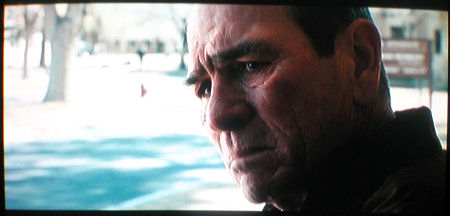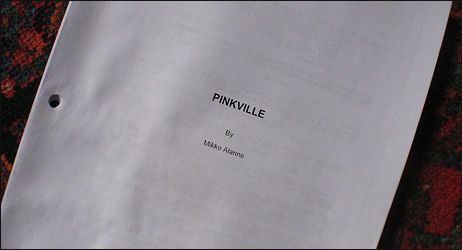The differences betwen Robert Koehler‘s Variety review of Paul Haggis‘s In The Valley of Elah (Warner Independent, 9.14 and 9.21) and my own opinion thing-dingie, which I ran last month, aren’t as profound as they may seem.

The only serious divide is Koehler feeling it’s “too self-serious to work as a straight-ahead whodunit and too lacking in imagination to realize its art-film aspirations” while I believe it exemplifies the kind of films that never seem to be doing all that much, but then gradually sneak up on you, laying groundwork and planting seeds and lighting all kinds of fires and feelings. Koehler is wrong, but I respect his intellect and perceptions. It’s just an honest different of opinion.
Otherwise, we both admire Tommy Lee Jones‘ performance and Roger Deakins‘ cinematography, and we both have problems with Mark Isham‘s score and particularly an Annie Lennox song that Haggis stuck on to the very end of the film — an element that wasn’t in the version I saw several weeks ago.
What Keohler seems to miss is that Elah isn’t some concoction, some tricks-of-the-trade movie that’s mainly about pushing buttons and playing audiences like an organ. It’s primarily about respecting real-life experience and refining this into art. Haggis’s screenplay is based on a true story that happened in the summer of ’03, and was first reported a year later in a Playboy magazine article by Mark Boal, called “Death and Dishonor.”
It came from Boal interviewing Lanny Davis, a former U.S. Army M.P., about the death of his son, who had been reported AWOL following a tour of duty in Baghdad. Haggis bought the rights and created a somewhat fictionalized version, although he stuck to the basic bones.
The result, as I said several weeks back, is “more than just a respectable true-life drama, and a helluva lot more than the sum of its parts. I think it’s close to an epic-level achievement because it’s four well-integrated things at once — a first-rate murder-mystery, a broken-heart movie about parents and children and mistakes, a delivery device for an Oscar-level performance by Tommy Lee Jones, and a tough political statement about how the Iraq War furies are swirling high and blowing west and seeping into our souls.”



